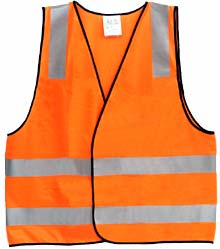RFA Warranty
RFA safety clothing is unconditionally guaranteed for 30 days from purchase date against manufacturing and material faults and defects, but only in situations where the product has been used in conformity with its intended use.
In the case of product defect claimants should send details together with the garment direct to RFA for assessment and possible replacement.
Garment Maintenance
RFA provides sew-in labels detailing care instructions with all safety clothing. Proper maintenance and care will ensure an effective life for the garment and the maintenance of its safety characteristics.
Industrial Wash
Care for sew-on fabrics incorporating 3M Reflective Material 9910 and 9920.
9910-wash temperature under 73°C. Active alkalinity less than 1000ppm.Ph less than 11.6. No solvenated surfactants. Low to medium alkaline, high-surfactants preferred. Tumble dry warm, 48°C. Professionally dry clean.
9920-Medium to heavy soil. Wash temperature 75°C. Break/suds cycle: less than 20 minutes total. Do not use solvenated surfactants. Tunnel dry 160°C. Drying time not exceed 7 minutes. Tumble dry 90°C. Professionally dry clean.
Pressing for both products not to exceed 150°C.
Note Maximum shrinkage 3%
Note: Do not use bleach, only non chlorinated bleach when needed. Stain treatment wash processing will greatly reduce the life of 3M Scotchlife Reflective material.
Machine Wash
Care for Sew-on and heat laminated range, garments incorporating 3M Scotchlite reflective material.
Care for sew-on fabrics
Machine wash warm 40°C. Do not exceed 60°C. Tumble dry low. Professionally dry clean. P solvent temperature < 30°C.
Tumble dry warm 48°C. Warm hand iron 160°C, use pressing cloth.
Care for laminated films
Machine wash warm 40°C. Hand washing. Tumble dry low. Professionally dry clean P solvent temperature < 30°C.
Tumble dry warm 48°C. Cool hand iron 120°C. Use pressing cloth.
Note: Do not bleach, industrially wash or industrially dry clean either the sew-on or heat laminated materials.
Special Note
It is important to recognise that safety vests, and safety products in general, have a finite life particularly
where the working environment is demanding, dirty and dusty. Such situations require more frequent washing.
Most of us have seen persons wearing safety vests in work situations where the garments are less than
satisfactory, have deteriorated to a state where the safety factor is negligible, providing no real protection
to the wearer.
Australian Standards have prescribed the number of washes at which stage the effectiveness of the reflective capacity, and ultimately the safety value of garments is diminished. For more information and advice on garment maintenance call RFA direct.

